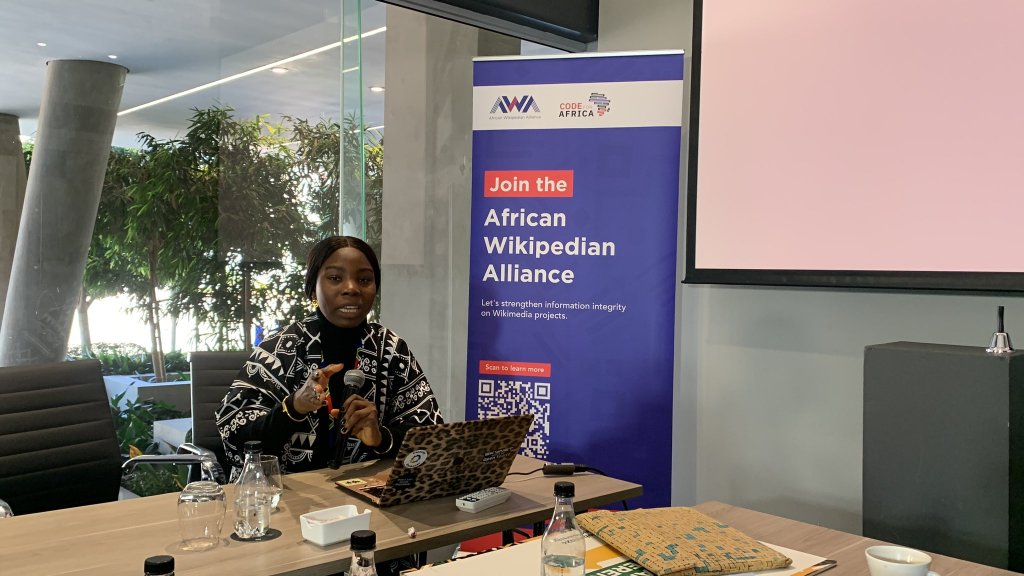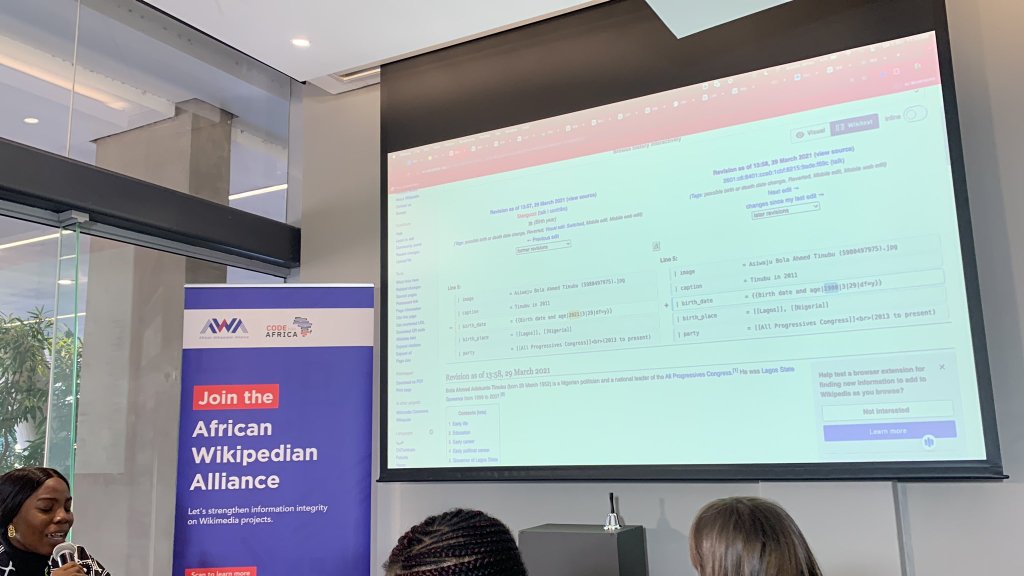The 10th annual Wiki Indaba conference, held from October 4–6, 2024, in Johannesburg, South Africa, has left a lasting impression and reinforced the commitment to building sustainable Wikimedia communities across Africa and the diaspora. This year’s theme, “! ke e: /xarra //ke” — “United in diversity” — perfectly captured the spirit of collaboration and unity that defined this milestone event . Code for Africa (CfA) and the African Wikipedian Alliance (AWA) joined this year’s event with renewed purpose, with its staff members- Amanda Strydom and Bukola James bringing their expertise to deliver a keynote, conduct a workshop, and engage in vital discussions on misinformation.

For AWA’s Francophone member, Emmanuelle Kakou, who is also the Coordonnatrice Générale, Wikimedia Community User Group of Côte d’Ivoire this marked a unique milestone as the first volunteer from the AWA Francophone community to receive an all-expenses-paid sponsorship from CfA to attend the conference as a result of her commitment to promoting AWA’s mission and her unwavering support towards the community growth. Emmanuelle also had an opportunity to take back all she had learnt from participating in different conversations back to the AWA Francophone community, sharing first-hand experience with the rest of the community.
In many ways, Code for Africa has grown to become the backbone of digital empowerment in Africa. As the continent’s largest civic tech and data journalism network, CfA supports groundbreaking initiatives, from AfricanDRONE and PesaCheck to AFCA and sensors.AFRICA. But beyond these programs, CfA is also the proud sponsor of AWA—a community initiative that has brought together over 308 African Wikipedians across both Anglophone and Francophone communities. Together, CfA and AWA represent a movement where people from all walks of life work to verify facts, close knowledge gaps, and stand as guardians against content manipulation on Wikipedia and its sister platforms.

On the second day of the conference, Amanda Strydom, CfA’s Senior Program Manager for CivicSignal, opened with a keynote that left a lasting impact on everyone in the room. Amanda spoke passionately about “The Value of Fact-Checking for Open Knowledge,” sharing insights on how CfA uses its resources to support community engagement and fight misinformation. The talk wasn’t just about CfA’s many projects but about how our communities, united by shared goals, are actively protecting and promoting African narratives. For Emmanuelle and other attendees, Amanda’s address reinforced the importance of this work and the sense of shared responsibility across African Wikimedia communities.


The commitment to accuracy came alive later that day when I led the AWA fact-checking workshop with Amanda. The session, titled “How to Tackle Mis/Disinformation on African Content on Wikipedia,” drew a diverse group of participants, eager to understand the inner workings of fact-checking on one of the world’s most visited websites. The workshop blended theory with practical exercises, guiding participants through scenarios on identifying and correcting false information on Wikipedia. Together, we tackled real issues, like debunking misinformation on an African Wikipedia article such as Chindima Adetshina, while covering essential topics like:
- Recognising information disorder and its effects
- Tools and methods for fact-checking on Wikipedia
- Practical application through scenario-based exercises
As we walked participants through the hands-on activities, I watched the group’s curiosity deepen. The questions grew more nuanced, the discussions more engaging with everyone contributing to the questions generated from the workshop exercise fully, showing a determination that reflected their commitment to bringing these skills back to their various communities. By the end, the session felt less like a workshop and more like a mission shared by everyone in the room. The participants left with the tools they needed and a new sense of how to contribute to Wikipedia in a way that would ensure the accuracy of African content for future generations.
Throughout the conference, feedback was overwhelmingly positive. Participants expressed appreciation for the workshop, with many describing it as a unique experience in their Wikipedia journeys. Some community leaders voiced their desire to host similar workshops in their own regions, opening the door for even more collaboration with AWA and CfA. The atmosphere was alive with the excitement of potential new partnerships, and I couldn’t help but feel that this event was just the beginning.
In the days following Wiki Indaba, as we all returned to our respective countries, the lessons we learned and the relationships we built continued to resonate. For AWA, the experience offered not just the chance to help African Wikimedians acquire fact-checking skills but to be part of something larger—a community where each contribution, each fact-checked article, adds to the rich, diverse story of Africa.

As AWA and CfA look ahead, we’re reminded that this journey is about more than just workshops or conferences. It’s about building a foundation that amplifies African voices and has the resources and support they need to make factual contributions to global knowledge. By fostering these connections and empowering these voices, we are building a future where Africa’s stories are told by those who live them, ensuring they are accurate, verified, and celebrated across the world. Join our growing community of fact-checking practitioners on Wikipedia and its sister projects by completing our membership form and connect via our Anglophone and Francophone channels for instant update. Also check out all of our past and present programs via meta.

Can you help us translate this article?
In order for this article to reach as many people as possible we would like your help. Can you translate this article to get the message out?
Start translation